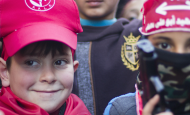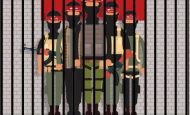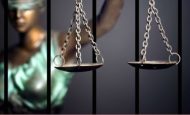Factually Inaccurate and Legally Flawed: HRW’s 2017 Report
I. INTRODUCTION
Human Rights Watch (HRW) is a powerful NGO, with a massive budget, close links to Western governments, and significant influence in international institutions. Its publications reflect the absence of professional standards, research methodologies, and military and legal expertise, as well as a deep-seated ideological bias against Israel.
HRW’s review of “Israel and Palestine: Events of 2017” (a chapter in HRW’s 2017 annual report), reflects these same methodological flaws, resulting in a highly skewed representation of Israeli domestic and international law.
The following systematically analyzes the various claims made by HRW in its report. The factual and legal arguments presented demonstrate that NGO is not advocating for universal human rights, but is instead focused on delegitimizing Israel.
II. ISRAEL’S SOVEREIGN RIGHT TO CONTROL ITS BORDERS
Claim
“The Israeli government continued to enforce severe and discriminatory restrictions on Palestinians’ human rights; restrict the movement of people and goods into and out of the Gaza Strip…”
NGO Monitor Analysis
HRW asserts the false and disingenuous claim, often proffered by BDS activists, that Israel imposes “discriminatory restrictions” on Gaza. (Use of this dishonest terminology by HRW is not surprising given that HRW’s Israel program is headed by a long-time BDS promoter.)
In contrast to HRW’s claim, under international law, all countries have the right to control access to their territory. To the extent it applies, Article 23 of the Geneva Convention (which sets standards for the provision of limited humanitarian aid), Israel has no obligation to provide any goods, even minimal humanitarian supplies, if it is “satisfied” that such goods will be diverted or supply of such goods will aid a terrorist organization. Under the legally binding Chapter VII Security Council Resolution 1373, it is illegal to provide any direct or indirect material or financial support for terror organizations.
Since 2007, the terrorist organization Hamas has been in control of Gaza. Hamas, Islamic Jihad, and other Palestinian terror factions have launched thousands of indiscriminate attacks against Israeli population centers. These groups have attacked the border crossings into Israel on numerous occasions disrupting the flow of goods and people. Hamas has stolen hundreds of millions of dollars in humanitarian aid and diverted that aid for weaponry, building terrorist infrastructure, and the personal bank accounts of Hamas officials. Hamas has also exploited Israel’s entry system to carry out terror attacks on Israeli civilians and to import weaponry and materiel.
Although Israel is under no legal obligation and despite the diversion as well as attacks on the Israeli border crossings, Israel continues to provide hundreds of tons of humanitarian supplies to Gaza on a weekly basis and tens of thousands of medical permits annually.
These facts are ignored by HRW.
Claim
“Israel continued to maintain its decade-long effective closure of Gaza, exacerbated by Egypt’s keeping its own border with Gaza largely sealed, and to impose restrictions that limit supply of electricity and water, restrict access to medical care and educational and economic opportunity, and perpetuate poverty. Approximately 70 percent of Gaza’s 1.9 million people rely on humanitarian assistance.”
NGO Monitor Analysis
As mentioned, under international law as analyzed above, Israel is not obligated to supply Gaza with electricity, medical care, or provide “opportunity.” Moreover, no obligation is created merely because there is a dependence on Israel for these items. In any event, Israel continues to supply Gaza weekly with millions of liters of fuel and thousands of kilowatts of electricity, medical permits, and facilitates educational and economic projects.
Again, HRW ignores the mass diversion of aid, electricity, and other resources by Hamas for its own purposes at the expense of its own people.
HRW also ignores the significant Palestinian infighting whereby the PA has blocked access to electricity and medicines due to its political war with Hamas. As noted explicitly by the UN, the restrictions that HRW blames on Israel are entirely attributable to Hamas and PA infighting:
“At the heart of this deterioration is an aggravation of Gaza’s longstanding electricity crisis. In mid-April 2017, Gaza’s sole power plant (the ‘GPP’), which provided about a third of Gaza’s electricity, was forced to shut down following the failure by the two parties to resolve a dispute over the payment of taxes on fuel. In May, the Palestinian Authority informed the Israeli Electricity Company (IEC) it will no longer fully pay for the electricity supplied to Gaza through Israel and requested that supply be reduced by 30 per cent.”
See below for more on the medical situation.
Claim
“Israeli restrictions on the delivery of construction materials to Gaza and a lack of funding have impeded reconstruction of the 17,800 housing units severely damaged or destroyed during Israel’s 2014 military operation in Gaza. About 29,000 people who lost their homes remain displaced. The Israeli government sought to justify the restrictions by saying that construction materials can be used for military purposes, including fortifying tunnels; it allowed only limited quantities to enter, under the supervision of international organizations.”
NGO Monitor Analysis
Again, HRW grossly distorts the facts. First, according to statistics from the World Bank, the lack of international funding has been a major impediment to Gaza reconstruction. Second, HRW hides that Hamas was charging recipients of new housing to make a $40,000 payment to Hamas, while other housing aid was diverted to Hamas cronies. Third, HRW fails to note that Hamas and other terrorists organizations diverted construction materials for terror attack tunnels.
Claim
“As of August, 40 percent of medications on the ‘essential drug list’ were at zero stock in Gaza, according to the WHO.”
NGO Monitor Analysis
Again, HRW is falsely blaming Israel for problems directly stemming from Palestinian infighting. According the UN’s July 2017 Gaza Appeal:
The provision of health services is also challenged by additional factors. Delays in the shipment of essential drugs and disposables from the West Bank by the PA’s Ministry of Health (MoH), has resulted in some 37% per cent of essential pharmaceuticals and 32% of medical supplies being at zero stock at Gaza’s Central Drug Store. The MoH appears to have also recently been delaying or suspending the payment for the referral of patients to medical treatment outside Gaza, as reported by the World Health Organization, with about 1,600 patients currently on a waiting-list at the time this document went to print. (emphasis added)
III. ISRAEL MILITARY LAW
Claim
“Israel operates a two-tiered system in the West Bank that provides preferential treatment to Israeli settlers while imposing harsh conditions on Palestinians.”
NGO Monitor Analysis
HRW’s claim is false. Israeli citizens and Palestinian residents of Israel are subject to Israeli law while more than 95% of Palestinians living in the West are subject to jurisdiction and law of the Palestinian Authority. The remaining 5% of Palestinians are subject to Israeli jurisdiction pursuant to the Oslo Accords, mutually agreed upon by Israel and the PLO.
Claim
“Israeli military authorities detained Palestinian protesters, including those who advocated nonviolent protest against Israeli settlements and the route of the separation barrier.”
NGO Monitor Analysis
According to the applicable law, Palestinians can only be arrested by Israel if they are suspected of committing an offence that falls within the jurisdiction of the Israeli courts. In contrast to HRW claims, merely “advocating nonviolent protest” is not an offence. Moreover, the Palestinians detained were arrested because there was evidence of their engaging in violent assaults or other illegal activity.
Claim
“Israeli authorities try the majority of Palestinian children incarcerated in the occupied territory in military courts, which have a near-100 percent conviction rate.”
NGO Monitor Analysis
HRW grossly misrepresents the facts. The vast majority of Palestinian minors that are arrested in the Palestinian Authority are tried by the PA justice system. Under the Oslo Accords, the Israeli military courts have jurisdiction over Palestinian residents of the West Bank in only a limited subset of violent crimes or terrorism offenses. Moreover, under the international law that HRW says applies to the West Bank, Israel is required to exclusively use military courts for these offenses. If Israel were to try such Palestinians in the civilian courts, HRW would accuse Israel of annexing the West Bank.
HRW’s “statistic” on the conviction rate is similarly distorted, irrelevant, and provided without context. For example, HRW fails to note that the courts will only prosecute those cases where there is strong evidence in support of a conviction. The conviction rate is also due to plea bargains. HRW fails to mention that high conviction rates based on plea bargains is not unique to Israeli Military Courts, but rather is common in many jurisdictions, including US federal courts.
Claim
“Israeli security forces arrested Palestinian children suspected of criminal offenses, usually stone-throwing, often using unnecessary force, questioned them without a family member present, and made them sign confessions in Hebrew, which most did not understand.”
NGO Monitor Analysis
HRW’s claims are unfounded and demonstrate considerable lack of knowledge and confusion on the part of HRW. These claims have been systematically analyzed by NGO Monitor and found to be lacking both factual and legal basis (see NGO Monitor’s reports “UNICEF and its NGO Working Group: The Campaign to Blacklist the IDF,” “No Way to Represent a Child: Defense for Children International – Palestine’s Distortions of the Israeli Justice System,” “The Origins of ‘No Way to Treat a Child’: Analyzing UNICEF’s Report on Palestinian Minors,” and “Addameer: the PFLP Prisoner Advocacy Wing.”)
For instance, when HRW complains that the Palestinian suspects are questioned without the presence of a family member, they appear to be unaware that there is no internationally recognized standard that requires minors to be interrogated in the presence of a family member. Furthermore, according to Israeli law, a minor suspect interrogated while under arrest does not have the right to be interrogated in the presence of his parents/family member. The same rules that Israel applies to its own population are also applied to Palestinians in the West Bank.
The Palestinian minors are made to “sign confessions in Hebrew” is simply a lie. First, by law, a suspect has the right to refuse to sign any statement he gives. This provision is further fortified by the fact that the Israeli military courts apply the same rules of evidence as the applied in the Israeli domestic courts. These rules provide that for a statement to be admitted into evidence, the court must be persuaded that it was given freely and willingly and if not, it is grounds for acquittal. Second, all interrogations of Palestinian minors are carried out in Arabic. According to IDF statistics, most statements of Palestinian minors are also written in Arabic. Additionally, the publicly stated policy of the IDF military prosecution for the West Bank is that if the statement of the Palestinian minor is written only in Hebrew, then no indictment will be submitted unless the interrogation was either audio or audio-visually recorded or it can be proven that the suspect was fluent in Hebrew.
Claim
“Israel jails many Palestinian detainees and prisoners inside Israel, violating international humanitarian law requiring that they not be transferred outside the occupied territory and restricting the ability of family members to visit them.”
NGO Monitor Analysis
Israel’s Supreme Court has twice adjudicated this subject, and found that the practice was well founded in international law. Moreover, the visitation of Palestinian prisoners from the West Bank is organized by the International Committee of the Red Cross. Only persons who pose a security threat are denied the right to visit incarcerated relatives. This provision is applied equally to any person wishing to visit a prisoner, even if the prisoner is held in the Ofer prison located in the West Bank.
IV. DOMESTIC ISRAELI LAW
Claim
Israeli authorities have continued to narrow the space for criticism of its policies toward Palestinians. In March, the Knesset passed a law barring entry to foreigners who call for boycotting Israel or settlements. Authorities continue to impose onerous reporting requirements on nongovernment organizations receiving most of their funding from foreign government entities.
NGO Monitor Analysis
HRW’s claim has no basis. Under international law, Israel has the unequivocal right to control entry policies into its territory. Countries around the world, including the US, the UK, and Canada, bar individuals on the basis of political ideology. In this case, Israel is barring entry to those advocating for the economic and physical destruction of the state, far more serious grounds than restrictions applied in other Western countries. In addition, the law in no way “narrows the space for criticism.” Individuals barred from entry to Israel are not blocked in any way from expressing their criticism. And in fact, these people have continued to do so routinely on their websites, on social media, and in opeds in the New York Times, Ha’aretz, and the Forward, among dozens of other news outlets.
It is also false to claim NGOs receiving foreign funding are subject to onerous reporting requirements. All countries impose reporting requirements on registered individuals and entities. The form for reporting foreign donations simply requires listing the donor and amount of money provided. It is far less onerous than reporting requirements in the United States, the EU, or the UK.
V. INTERNATIONAL NORMS AND LAW
Claim
“In December 2016, the UN Security Council unanimously adopted a resolution, with the US abstaining, that said settlements have “no legal validity,” are a “flagrant violation” of international law and a “major obstacle” to peace between Israel and the Palestinians.”
NGO Monitor Analysis
HRW’s selective reading of UN Security Council resolution 2334 ignores provisions of the same resolution that the Palestinian Authority breaches on a daily basis.
For example, the resolution 2334 calls for “both parties to… refrain from provocative actions, incitement and inflammatory rhetoric … ;”, take “immediate steps to prevent all acts of violence against civilians, including acts of terror, as well as all acts of provocation and destruction, …and to clearly condemn all acts of terrorism;” and “Recalling also the obligation under the Quartet roadmap for the Palestinian Authority Security Forces to maintain effective operations aimed at confronting all those engaged in terror and dismantling terrorist capabilities, including the confiscation of illegal weapons…”
In direct breach of these provisions, the PA proliferates racist hate speech; incites terrorism and violence; fails to condemn terror acts committed by Palestinians against Israelis; glorifies terrorists; and does nothing to confront or dismantle the terrorist capabilities of the so-called “Palestinian factions” – a euphemism for internationally recognized terrorist groups such as the Hamas and the Popular Front for the Liberation of Palestine.
By focusing on Israel alone, HRW exposes its bias and particularistic application of human rights and its lack of credibility in analyzing the Arab-Israeli conflict.
VI. SECURITY CONCERNS
Claim
“Tensions around the Al-Aqsa/Temple Mount compound in July-August 2017 triggered an escalation in violence. Israeli security forces used lethal force against demonstrators and against suspected attackers in the West Bank and at the Gaza border.”
NGO Monitor Analysis
Shamelessly, HRW fails to note that the “tensions around the Al-Aqsa/Temple Mount compound” were sparked by a terrorist attack on the Temple Mount – in which three Palestinian terrorists shot and killed two Israeli police officers. The ensuing “tensions” were a direct result of incitement by the PA, Hamas, and other terrorist organizations. For instance, following the terror attack, on its official Facebook page, Fatah glorified the terrorists, stating that “We must guard the flowers of the Martyrs (quote from poem by Palestinian poet Mahmoud Darwish -Ed.) And we must live as we wish.”
Claim
“Israel maintained onerous restrictions on the movement of Palestinians in the West Bank, including checkpoints and the separation barrier, a combination of wall and fence in the West Bank that Israel said it built for security reasons.”
NGO Monitor Analysis
HRW’s statement minimizes and questions Israel’s security concerns. Doing so is a typical component of HRW’s reporting on Israel, which routinely erases Palestinian incitement and terror attacks (see example above). HRW’s practice may also stem from the fact that several of the Palestinian NGO with which it consults are linked to the PFLP terrorist organization. HRW negates the fact that the security fence and checkpoints were established in response to a wave of suicide bombings and shooting attacks that took the lives of thousands of Israelis and Palestinians in the early 2000s. The subsequent reduction in the number of terror attacks is testament to the effectiveness of these measures.




